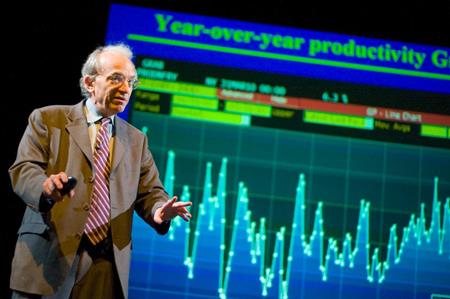
Predicting the future is impossible. Nobody, literally nobody, knows what will happen next.
Yet back on Jan. 7 of this year Wharton’s Jeremy Siegel made an observation about stocks.
“I actually think we’re going to get 8% to 10% this year,” Siegel told CNBC then. “I don’t think it’s going to be all that bad.”
We wrote about that call not because we believe for a minute that Siegel is prophetic, better informed or smarter than other investors. We wrote about it because broadly speaking he’s right about how investing works every year, not just this year.
At the moment, the S&P 500 is comfortably in double-digit territory. The Dow is flirting with 20,000.
There’s a difference between predicting the future and investing for the future. Siegel’s own research on stocks, for instance, is simple, smart and perhaps a bit obvious.
Stocks return over the long run about double the rate of overall economic growth. The reason why is reinvested dividends. The lower your cost for owning that return, the better.
Everything else that’s investable — bonds, gold and cash — will earn less.
Why? Because the alternatives to stock investments are not geared to the economy itself.
Bonds are loans. They pay based on the prevailing interest rate. The interest rate is a pale reflection of the economy, a guess at what might happen in the coming years in terms of inflation.
Gold does not pay dividends. It is an investment that relies on fears about the economy, a pale reflection of a pale reflection at best.
You could have made some money in gold a few years ago, and maybe you could a few years from today. The other distinct possibility is a long-term washout or losses.
Cash is not an investment. It’s cash. Because of inflation, cash loses purchasing power every day you hold it. The only way cash “makes” money is a deflationary scenario, which the world’s central banks fight tooth-and-nail for good reason.
You could come up with alternatives to these four asset classes, and the big private endowments and pension funds do that.
They invest in hedge funds, private equity, real estate and the like. For the normal retirement investor, the only realistic way to invest in these vehicles is to own real estate via exchange-traded funds, perhaps.
Would that be better or worse than owning a portfolio of stocks and bonds — foreign and domestic, large cap and small — and rebalancing with discipline? It’s hard to say.
Our position at Rebalance is that investors should not chase investments deemed “alternative” on the presumption that alternative means “better.” Often it does not.
Winners and losers
There are a few weeks left, so what happens next is as big a guess, however informed, as Siegel made back in January.
And yes, someone in the world almost certainly did “better” than a globally diversified stock and bond portfolio did this year.
They also almost certainly took far more risk in the attempt, meaning that for every 100 investors who took the alternative approach, a handful “won” while many others lost and lost badly.
Once you book those deep losses you need ever-greater “winning” years to get back to even. Risk is magnified until losses are total.
The fact remains that the boring old “normal” approach to retirement investing did very well indeed and will continue to do well year after year, compounding your money into a real retirement over time.
The growth of the world creates the growth of the stock market. Ignoring that is ignoring the facts.





